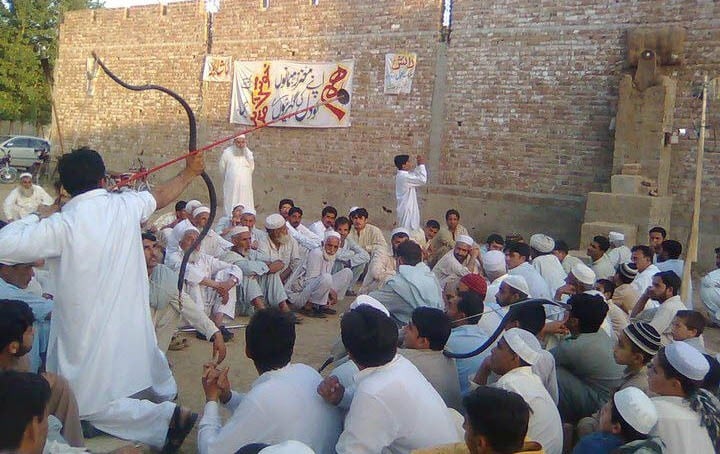
More Pashtuns live in Karachi than any other city in the world and they are concerned about their heritage

It was the afternoon of September 24. A group of people -- both young and old -- gathered at the provincial office of the Pakhtunkhwa Milli Awami Party situated at Baacha Khan Chowk, Banaras, in Karachi, with note books and pieces of paper. All of them were poets belonging to the Ittefaq Pakhto Adabi Jirga, a Pashto literary outfit, and were there to hear and discuss each other’s poetic work.
In Karachi’s Pashtun populated nieghbourhoods, several literary organisations, called Tolana in Pashto, have been active in organising literary events, such as arranging mushairas and launching ceremonies of poetic work and anthologies. Among them, the Ittefaq Pakhto Adabi Jirga is the oldest one, which was founded in 1986. Other organisations active in the city include: the Pak Pakhto Adabi Tehreek, Jaras Adabi Jirga, the Tor Ghar Pakhto Adabi Caravan, the Swat Pakhto Adabi Guloona and Pakhto Adabi Kaltoori Tolana.
However, members of these organisations have been showing concerns that new generation (or children of old settlers) of Pashtuns in this city have steadily been forgetting their language and culture in this multi-ethnic and multi-cultural city.
Undoubtedly, Karachi presently hosts the largest urban Pashtun population, surpassing those in Peshawar, Quetta and Kandahar and Kabul. Karachi is the largest Pashto-speaking city in the world; more Pashtuns live in Karachi than any other city in the world. Pashtuns have lived in Karachi since Partition; for many, Karachi is their first home.
Karachi’s Pashtuns mostly live in lower-income neighbourhoods, including settlements around the Super Highways such as Sohrab Goth, Sindh Industrial Trade Estate (SITE), Landhi Industrial Area, Korangi Industrial Area, Keamari, Baldia Town, Sultanabad and Pipri. A majority of these residents originate from Malakand, Hazara and Mardan Divisions of Khyber Pakhtunkhwa, South Waziristan, Bajaur, the Mohmand and Khyber tribal agencies of FATA, and Pashtun districts in Balochistan. Again, severe poverty, unemployment, and high population growth are the key reasons why Pashtuns from these areas migrated to the city.
Pashto poets, most of them were from working-class, regularly sit together and organise literary and cultural activities on a regular basis with donations from community members. Sarwar Shamal, a Karachi-based poet and cultural activist, says that Pashto literary activities were on the rise in the 1980s and ’90s. "But after then, we saw a significant decline in the activities". However, he said, in recent months, Karachi saw again a rise in such activities.
Read also: Editorial
"We recently observed that a number of Pashtuns in the city have been having their wedding cards published in Pashto," Shamal tells TNS.
Shamal has been preparing to organise a mega Pashto cultural event in the metropolis these days. For the past few weeks, he has been busy meeting with various Pashto literary outfits, individuals and political activists to make it happen. His purpose behind organising this event is to retain Pashto language, poetry and culture in Karachi. "In this event, we will display Pashtun cuisine, dresses and shoes, poetry books and hujra and organise theatre and poetry sessions," Shamal says.
Rise in publishing of Pashto books also corroborates that the city has been witnessing a rise in Pashto literary activity. A number of Karachi-based poets have published their work and anthologies. All of them are self-published and their main theme is peace and war -- thematically similar to the situation in the Pashtun region.
A poet, who recently published his book says he spent Rs35,000 for publishing 500 copies of his work. "I collected money with great difficulty and spent it for the promotion of language."
In some neighbourhoods, such as Sultanabad, Hijrat Colony, City Railway Colony, Muslim Abad, Future Colony and Frontier Colony, where residents from Buner, Swabi and Mardan districts live in significant numbers, a traditional archery sport ‘Makha" (some pronounced it as Mokha), dating back hundreds of years, has regularly been played.
Makha players say that archery was used as a tool in warfare in the past, but after the invention of modern weapons, it has now turned into a game, mainly in the land of the Yousafzai tribe -- Swabi and Buner districts of KP.
Taj Muhammad Jadoon, an organiser of Makha, says that most Pashtuns living in Karachi moved to the city in the 1960s and their younger generations do not know much about their traditional games. "They [traditional games] are part of our history. They are what keep us in touch with our roots," he says."It’s not really the children’s fault; all they’ve grown up with is cricket. So this tournament is our attempt to not only save this game, but our heritage too."
Karachi has its own significance in the Pashto film industry. Badar Munir, the biggest superstar of Pashto movies, drove a rickshaw in Karachi before he landed a job in showbiz as a lighting technician for a Waheed Murad film. In 1970, Murad recommended Munir to some directors who decided to make the first Pashto film. However, the film industry shifted to Lahore from Karachi in the 1980s.
Until the 1990s, even Pashto music cassettes were released at Karachi’s Lea Market and Juna Market, but after that this business too moved to Peshawar and other parts of the country. Also, there were over 25 cinemas screening Pashto movies in the city until ten years ago. But only three to five cinemas are now left that show Pashto movies.
However, in all our cultural activities in the metropolis, women are completely absent. They have limited or no opportunities to socialise and entertain, despite living in the country’s largest urban centre.